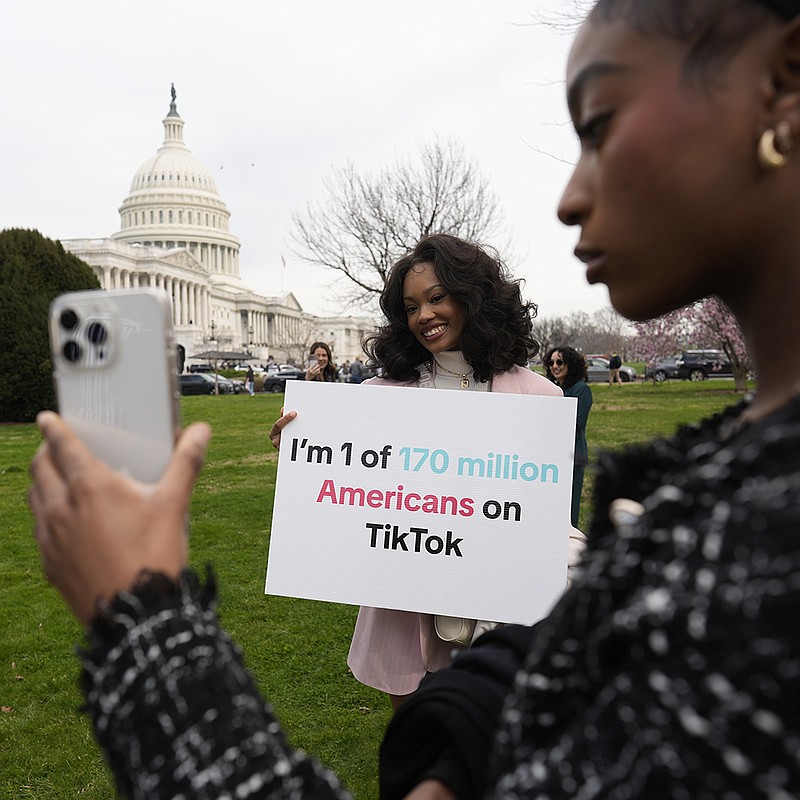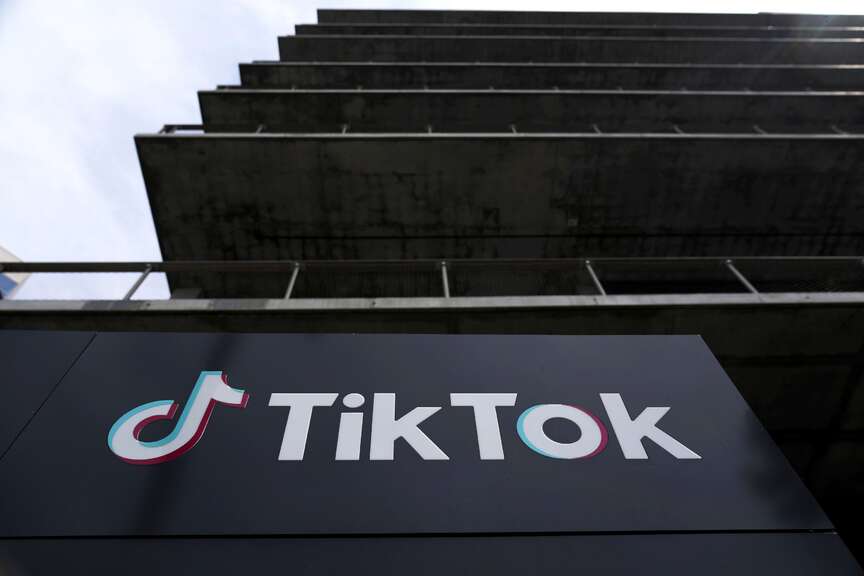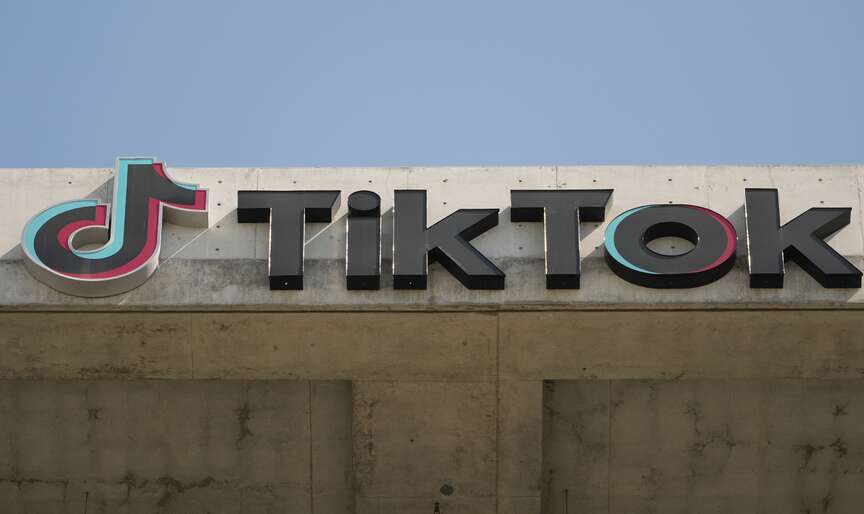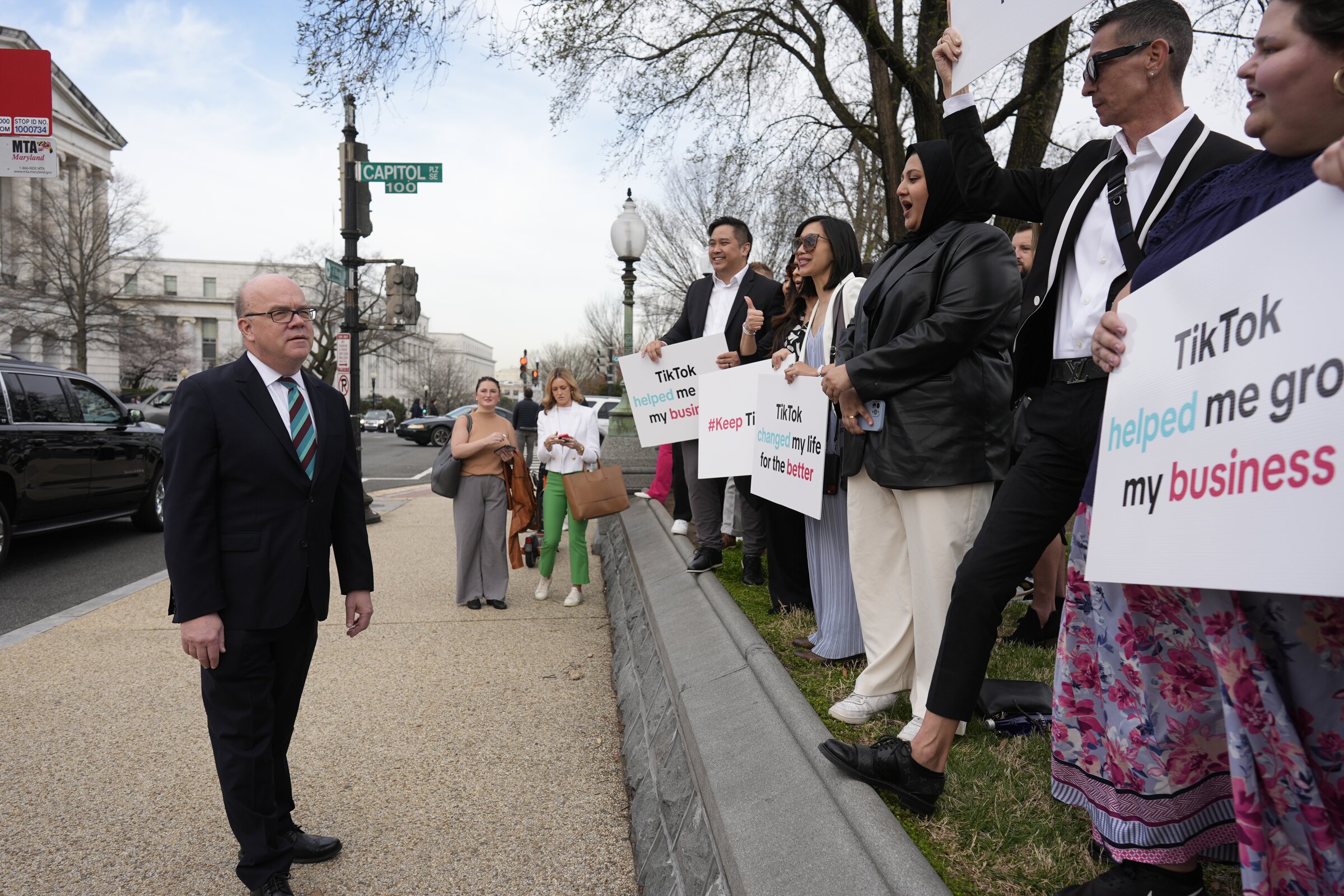WASHINGTON -- The House on Wednesday passed a bill that would lead to a nationwide ban of the popular video app TikTok if its China-based owner doesn't sell its stake, as lawmakers acted on concerns that the company's current ownership structure is a national security threat.
The bill, passed by a vote of 352-65, now goes to the Senate, where its prospects are unclear.
TikTok, which has more than 170 million American users, is a wholly-owned subsidiary of Chinese technology firm ByteDance Ltd.
The lawmakers contend that ByteDance is beholden to the Chinese government, which could demand access to the data of TikTok's consumers in the U.S. whenever it wants. The worry stems from a set of Chinese national security laws that compel organizations to assist with intelligence gathering.
"We have given TikTok a clear choice," said Rep. Cathy McMorris Rodgers, R-Wash. "Separate from your parent company ByteDance, which is beholden to the CCP (the Chinese Communist Party), and remain operational in the United States, or side with the CCP and face the consequences. The choice is TikTok's."
Arkansas' four House members -- Republican Reps. Rick Crawford of Jonesboro, French Hill of Little Rock, Steve Womack of Rogers and Bruce Westerman of Hot Springs -- joined colleagues from both parties in supporting the bill.
"I realize there are millions of TikTok users across the country, including our district. I want these users to understand that our goal with this bill is not to ban TikTok," Womack said in a statement following the vote.
"Our goal is to protect users by separating apps from foreign adversaries, which in this case is the Chinese Communist Party. TikTok is accumulating mass amounts of data, gaining influence over its American users, and using it against them. This exposes us all to serious national security threats.
"We want TikTok to continue to operate, and it will if they choose to separate from the Chinese Communist Party."
Hill, who along with Crawford serves on the House Intelligence Committee, framed his vote as protecting Arkansans and Americans from "surveillance and manipulation by the Chinese Communist Party."
"There is no separation between national security and the state when it comes to the CCP. TikTok is using CCP-dominated technology that is being leveraged to gather massive amounts of data on American citizens, posing a major national security risk," Hill said.
"We must protect Americans from the growing threat of the CCP by requiring the sale of TikTok to an American company. Whether TikTok remains on the phones of Americans or not is now up to TikTok's owner, Chinese-headquartered ByteDance."
House passage of the bill is only the first step. The Senate would also need to pass the measure for it to become law, and lawmakers in that chamber indicated it would undergo a thorough review. Senate Majority Leader Charles Schumer, D-N.Y., said he'll have to consult with relevant committee chairs to determine the bill's path.
President Joe Biden has said if Congress passes the measure, he will sign it.
Schumer did not share a timeline for Congress' upper chamber to consider the measure, instead saying Wednesday that senators will "review the legislation when it comes over from the House."
One senator eager to vote on the House bill is Sen. Tom Cotton, R-Ark. The senator from Little Rock has not been shy in criticizing TikTok. Cotton pressed TikTok CEO Shou Zi Chew during a Jan. 31 hearing about the Chinese government's ability to access American TikTok users' data in addition to Chew's personal business experiences in China.
"TikTok's Chinese parent company -- like any other Chinese company -- is at the mercy of the Chinese Communist Party," Cotton told the Arkansas Democrat-Gazette in a statement Wednesday.
"We wouldn't have let the Russians operate Pravda in the U.S. during the Cold War, and allowing the app the remain under Chinese ownership will only continue to undermine our national security. We should ban TikTok or force it to be sold."
The House vote is the latest example of increased tensions between China and the U.S. By targeting TikTok, lawmakers are tackling what they see as a grave threat to America's national security -- but also singling out a platform popular with millions of people, many of whom skew younger, just months before an election.
In a video posted on Wednesday evening, Chew said that the company has invested to keep user data safe and the TikTok platform free from outside manipulation. If passed, he said the bill would give more power to a handful of other social companies.
"We will not stop fighting and advocating for you. We will continue to do all we can, including exercising our legal rights, to protect this amazing platform that we have built with you," Chew said in his message to the app's users.
In anticipation of the vote, a Chinese foreign ministry spokesman, Wang Wenbin, accused Washington of resorting to political tools when U.S. businesses fail to compete. He said the effort would disrupt normal business operations and undermine investor confidence "and will eventually backfire on the U.S. itself."
Overall, 197 Republican lawmakers voted for the measure and 15 against. On the Democratic side, 155 voted for the bill and 50 against.
Some Republican opponents of the bill said the U.S. should warn consumers if there are data privacy and propaganda concerns, but the final choice should be left with consumers.
"The answer to authoritarianism is not more authoritarianism," said Rep. Tom McClintock, R-Calif. "The answer to CCP-style propaganda is not CCP-style oppression. Let us slow down before we blunder down this very steep and slippery slope."
Democrats also warned of the impact a ban would have on users in the U.S., including entrepreneurs and business owners. One of the no votes came from Rep. Jim Himes, the ranking Democratic member of the House Intelligence Committee.
"One of the key differences between us and those adversaries is the fact that they shut down newspapers, broadcast stations, and social media platforms. We do not," Himes said. "We trust our citizens to be worthy of their democracy. We do not trust our government to decide what information they may or may not see."
The day before the House vote, top national security officials in the Biden administration held a closed-door briefing with lawmakers to discuss TikTok and the national security implications. Lawmakers are balancing those security concerns against a desire not to limit free speech online.
"What we've tried to do here is be very thoughtful and deliberate about the need to force a divestiture of TikTok without granting any authority to the executive branch to regulate content or go after any American company," said Rep. Mike Gallagher, R-Wisc., the bill's author, as he emerged from the briefing.
TikTok has long denied that it could be used as a tool of the Chinese government. The company has said it has never shared U.S. user data with Chinese authorities and won't do so if it is asked. To date, the U.S. government also has not provided evidence that shows TikTok shared such information with Chinese authorities.
Republican leaders moved quickly to bring up the bill after its introduction last week by Gallagher and Rep. Raja Krishnamoorthi, D-Ill. A House committee approved the legislation unanimously, on a 50-0 vote, even after their offices were inundated with calls from TikTok users demanding they drop the effort. Some offices even shut off their phones because of the onslaught. Supporters of the bill said the effort backfired.
"[It] provided members a preview of how the platform could be weaponized to inject disinformation into our system," Gallagher said.
Lawmakers in both parties are anxious to confront China on a range of issues. The House formed a special committee to focus on China-related issues. And Schumer directed committee chairs to begin working with Republicans on a bipartisan China competition bill.
Information for this article was contributed by Kevin Freking, Haleluya Hadero, Mary Clare Jalonick and Didi Tang of The Associated Press and by Alex Thomas of the Arkansas-Democrat-Gazette.
 Devotees of TikTok monitor voting at the Capitol in Washington, as the House passed a bill that would lead to a nationwide ban of the popular video app if its China-based owner doesn't sell, Wednesday, March 13, 2024. Lawmakers contend the app's owner, ByteDance, is beholden to the Chinese government, which could demand access to the data of TikTok's consumers in the U.S. (AP Photo/J. Scott Applewhite)
Devotees of TikTok monitor voting at the Capitol in Washington, as the House passed a bill that would lead to a nationwide ban of the popular video app if its China-based owner doesn't sell, Wednesday, March 13, 2024. Lawmakers contend the app's owner, ByteDance, is beholden to the Chinese government, which could demand access to the data of TikTok's consumers in the U.S. (AP Photo/J. Scott Applewhite) Devotees of TikTok gather at the Capitol in Washington, as the House passed a bill that would lead to a nationwide ban of the popular video app if its China-based owner doesn't sell, Wednesday, March 13, 2024. Lawmakers contend the app's owner, ByteDance, is beholden to the Chinese government, which could demand access to the data of TikTok's consumers in the U.S. (AP Photo/J. Scott Applewhite)
Devotees of TikTok gather at the Capitol in Washington, as the House passed a bill that would lead to a nationwide ban of the popular video app if its China-based owner doesn't sell, Wednesday, March 13, 2024. Lawmakers contend the app's owner, ByteDance, is beholden to the Chinese government, which could demand access to the data of TikTok's consumers in the U.S. (AP Photo/J. Scott Applewhite)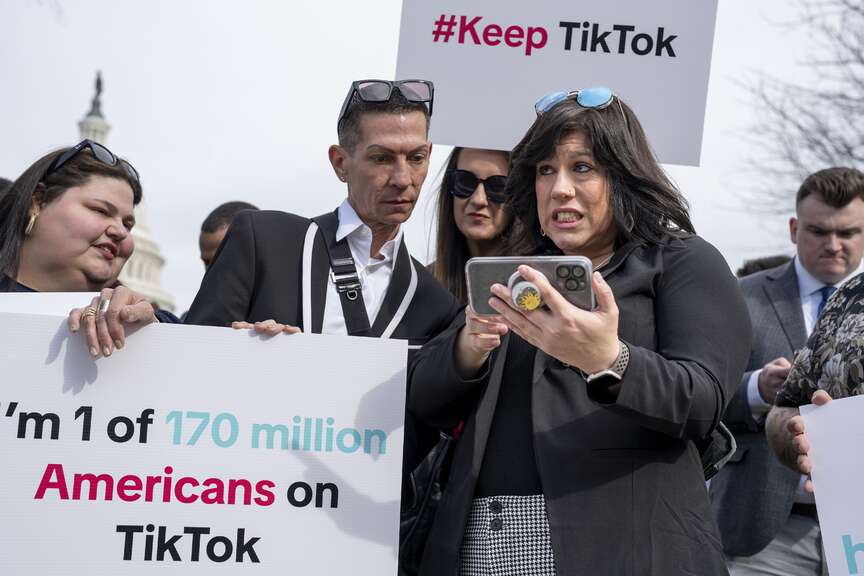 Devotees of TikTok monitor voting at the Capitol in Washington, as the House passed a bill that would lead to a nationwide ban of the popular video app if its China-based owner doesn't sell, Wednesday, March 13, 2024. Lawmakers contend the app's owner, ByteDance, is beholden to the Chinese government, which could demand access to the data of TikTok's consumers in the U.S. (AP Photo/J. Scott Applewhite)
Devotees of TikTok monitor voting at the Capitol in Washington, as the House passed a bill that would lead to a nationwide ban of the popular video app if its China-based owner doesn't sell, Wednesday, March 13, 2024. Lawmakers contend the app's owner, ByteDance, is beholden to the Chinese government, which could demand access to the data of TikTok's consumers in the U.S. (AP Photo/J. Scott Applewhite)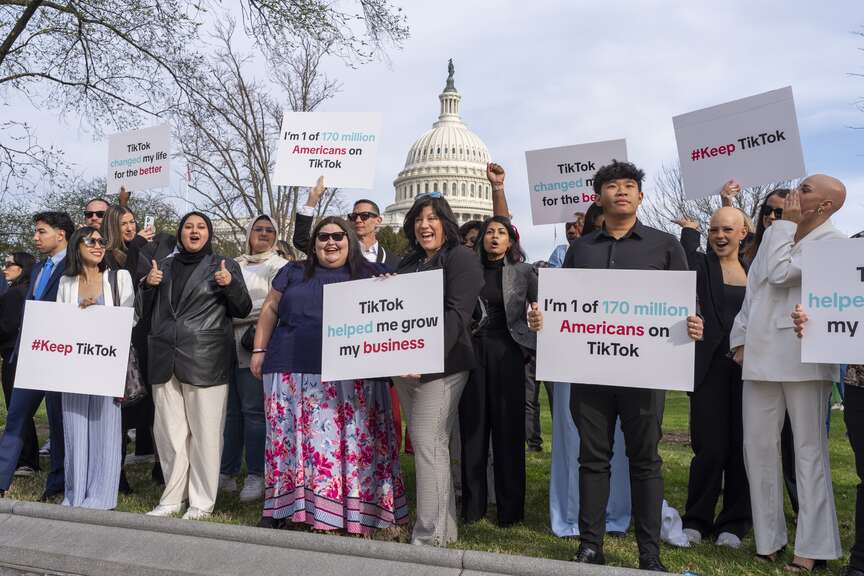 Devotees of TikTok cheer their support to passing motorists at the Capitol in Washington, before the House passed a bill that would lead to a nationwide ban of the popular video app if its China-based owner doesn't sell, Wednesday, March 13, 2024. Lawmakers contend the app's owner, ByteDance, is beholden to the Chinese government, which could demand access to the data of TikTok's consumers in the U.S. (AP Photo/J. Scott Applewhite)
Devotees of TikTok cheer their support to passing motorists at the Capitol in Washington, before the House passed a bill that would lead to a nationwide ban of the popular video app if its China-based owner doesn't sell, Wednesday, March 13, 2024. Lawmakers contend the app's owner, ByteDance, is beholden to the Chinese government, which could demand access to the data of TikTok's consumers in the U.S. (AP Photo/J. Scott Applewhite)